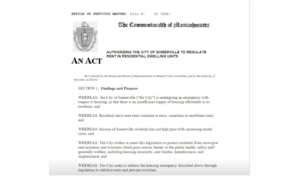A look at the tools recently introduced for use by the City.
(Somerville Wire) – Somerville is well-known for its progressive policies and has taken a strong stance on the use of surveillance equipment by the government—including police and fire departments. On October 4, 2017, the City signed an Executive Policy on Surveillance Technology, the first of its kind in the Commonwealth. In 2019, the Somerville City Council passed an ordinance banning the government from using face surveillance technology.
But how can you stay up to date on what the City is or isn’t allowed to use? On February 18, 2020, the Legislative Matters Committee met to discuss the Surveillance Technology Use Policy—which has been the subject of an ongoing conversation—and reviewed impact reports for each type of equipment on the table. The Somerville Wire sat down with City Councilor Ben Ewen-Campen for the breakdown of the technology that was newly approved:
“I really believe that whatever anybody thinks about surveillance technology, the decisions that we make need to be public. …I tend to believe that there needs to be really strict regulations on any technology that is broadly sucking up information,” said Ewen-Campen. He added, “All of the things that were approved thus far are things the Police Department uses or wants to use in the near future. There were two additional requests that are not actively used by the Police Department, and we did not approve those. That was license plate readers and something called BriefCam.”
Pole Cameras: These are fixed, stand alone cameras, installed in public areas. They would record visual footage only and be used during criminal investigations. They are meant to be positioned in a way that does not capture schools, hospitals, places of worship, or similar locations. “If they are pointed at a public location, where there is no expectation of privacy, that does not need a warrant, but if they are capturing a private residence or an area where there is expected privacy, they need a warrant.”
Homeland Security Cameras: There are roughly 30 cameras attached to traffic poles throughout Somerville and “owned and operated by the City of Somerville,” according to an impact report. They are made available through the Boston Office of Emergency Management “via funds from the federal government.” The primary purpose is to monitor traffic routes, but they can also be used in criminal cases or traffic investigations. They can be employed in the case of motor vehicle accidents, but they are mostly intended to assess routes in the case of an emergency requiring an evacuation.
GLX Cameras: Four stationary cameras were installed on Somerville roads to monitor Green Line Extension work and its impact on traffic. These are the same type of camera as the Homeland Security ones.
Covert Device Cameras: These are cameras hidden in household devices, such as an alarm clock, smoke detector, or computer speaker. During a criminal investigation, they would be placed in a suspect’s home, with the authority of a search warrant. They can also be used in public spaces, such as City owned buildings, streets, and open spaces. According to an impact report, “no formal training would be required as it is a simple device,” but they would be secured by a detective supervisor and used at their discretion. “Similarly to pole cameras, if you’re capturing information in a private location, there needs to be a warrant.”
GPS Monitors: They are meant to track stolen City property, when there is an uptick in the theft of bicycles or packages. Placed in items that are used as “bait,” they would track the object and lead the police to its location. To use the monitoring device, there would need to be an open investigation and the assignment of an incident number for tracking.
Thermal Imaging Cameras: Used by the Somerville Fire Department, these pick up the heat emitted by an object so that firefighters can determine the location and spread of a fire, locate and rescue victims or trapped people, assess structural dangers, and gather good images in situations where a traditional camera would not work. They are not to be used for law enforcement or intelligence gathering but are allowed in the cases of arson-related crimes. Firefighters must be trained before utilization, and data is not retained. While they can help identify where a person in danger is, they are only to be deployed in situations when needed to protect life or property. “You could imagine, it could easily be abused. You could point to someone’s house and see where every person in the house is. We want to make sure we’re strictly limiting how it can be used.”
GrayKey: This technology can be used to open locked devices, such as computers or cellphones, bypassing the need for a passcode. The Somerville Police Department has used this in the past, in conjunction with the Massachusetts Attorney General’s office, but does not own or operate it. GrayKey does not collect data but provides access to the electronic device. Currently, only one detective is trained to use the device and is “the only member of the department qualified to operate this technology,” according to an impact report.
“The case law on searches of electronic devices is changing very quickly. It used to be that if there was an investigation, you could get a warrant to search someone’s electronic devices. My understanding is that now, [still requiring a warrant], there needs to be reason to believe that the electronic device was used in the commission of the crime.” According to the case Commonwealth vs. Snow, for a search warrant to be issued, the government must show that “there is a ‘nexus’ between the alleged crime and the article to be searched or seized.”
All Somerville Wire articles may be republished by community news outlets free of charge with permission and by larger commercial news outlets for a fee. Republication requests and all other inquiries should be directed to somervillewire@binjonline.org.
Shira Laucharoen is assistant director of the Boston Institute for Nonprofit Journalism and assistant editor and staff reporter of the Somerville Wire.





